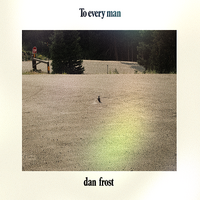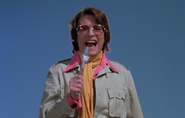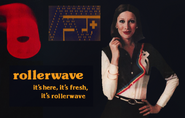No edit summary Tag: Visual edit |
(→TV) Tag: Visual edit |
||
| Line 33: | Line 33: | ||
* Electric Company |
* Electric Company |
||
| ⚫ | |||
| − | * Anything from the Film Board Of Canada |
||
| ⚫ | |||
*Schoolhouse Rock |
*Schoolhouse Rock |
||
*Welcome Back, Kotter |
*Welcome Back, Kotter |
||
| Line 62: | Line 61: | ||
*Devo |
*Devo |
||
*Andre Previn |
*Andre Previn |
||
| + | *Blondie |
||
== Activities == |
== Activities == |
||
Revision as of 01:53, 30 May 2022
Rollerwave is an aesthetic which does for the 70s what Outrun does for the 80s and Vaporwave does for the 90s. The name is a reference to the 1975 James Caan film Rollerball, and like the film, the aesthetic often delves into 1970s retrofuturism, however, unlike standard Retro-Futurism or Atompunk, Rollerwave deals only with the 70s, and has a far less Jetson-y feel. Common themes include oil crises, growing tension in the Middle East, everyday 1970s life, LaserDisc, household appliances, early computing, RadioShack, the NBC Peacock logo, and post-countercultural disillusionment.
Visual
Unlike Psychedelica and Pop Art, Rollerwave is less experimental or even thought-provoking- and is less flashy than Future Funk. However, due to Rollerwave's technological emphasis, it could be seen as the everyday equivalent of Future Funk- the daytime business casual activities to clash with Future Funk's breezy whirlwind nightlife. Much like Vaporwave and Synthwave, Rollerwave can feature mall, video game, and arcade aesthetics, but with more of a 70s flair (so less NES and more Atari 2600, Pinball, or Pong, and more urban department store/Kmart than standard shopping mall) as opposed to the 80s and 90s often associated with the prior aesthetics.
Visually, the Rollerwave aesthetic can draw from the comedies of the era, such as Network, Fun With Dick And Jane, or Car Wash- though mainstream social critique in the 1970s was notoriously scant. Rollerwave is indicative of a future where the Cold War never ended, computers still feature cold dark screens with robotic green text, and mundane tan office buildings are ever-present.
Like Vaporwave, Rollerwave can serve as a deconstruction and critique of capitalism and a reflection on nostalgia- however, unlike Grindhouse, Rollerwave takes a purely utopian approach, with a hint of societal issues and ominous tones thrown in. It does not concern itself with the lower classes of society, going instead for a privileged middle-class vibe, usually urban. Like the setting of Rollerball, Rollerwave is a futuristic projection of the 1970s where society does not advance in style or attitude past the 1970s, but makes substantial leaps ahead in technology, and the wanton economic corruption of the decade gives way to systemic injustice.
Fashion
Rollerwave fashion is reflective of the popular fashions of the 1970s, but only the mundane, everyday fashions- the sort of thing one would find in a Montgomery Ward or Woolworth's, or Gary Collins's closet. Sideburns are common, as are sports jackets and knee-high skirts. Above all else, Rollerwave fashion is not at all provocative or challenging to the mainstream.
Media
Film
- Rollerball
- Death Race 2000
- Taxi Driver
- Star Trek: The Motion Picture
- Logan's Run
- Network
- Zodiac
- Boogie Nights
- Annie Hall
- Anchorman
- Car Wash
- Fun With Dick And Jane
- Knife+Heart
- Beyond The Black Rainbow
TV
- Electric Company
- Sesame Street
- Schoolhouse Rock
- Welcome Back, Kotter
- All In The Family
- Starsky And Hutch
- That 70s Show
Music

"To Every Man," considered the first modern Rollerwave album.
The first modern Rollerwave album, "To Every Man," created by a musician going by the name of Dan Frost in 2017, was unknown until he went public in June 2021 after the album cover's leak. Frost describes the term "Rollerwave," which he coined, as an ironic response to Vaporwave. The full album was released on July 1, 2021 on Dan Frost's YouTube channel.
Earlier music that could be termed Rollerwave music can generally be attributed to the Scottish electronic music group Boards Of Canada, whose music is undeniably 70s, making use of analog reel-to-reel machines and keyboards, however some aspects of Daft Punk's music, in particular the music video for Technologik or the theme and tone of Random Access Memories, are reminiscent of the 70s. This makes sense, considering that according to the 30-year-cycle nostalgia for the 70s would crop up in the early 2000s and late 90s.
While Rollerwave music is usually electronic in nature, sampling 70s electronic groups such as Kraftwerk or Giorgio Moroder, soft easy-listening pieces and adult contemporary music from the 70s can also apply, or be sampled to create new pieces. (Think Meatloaf, Jim Croce or Billy Joel during his Stranger period.) Also Muzak. The latter pieces are considered "soft" while electronica-centric remixes can be deemed "hard" rollerwave.
While Boards of Canada are undoubtedly the progenitors of the early Rollerwave scene, several bands which preceded them could be considered Rollerwave listening. Modern Rollerwave, unlike the catalog of BoC, relies more heavily on samples than original synth scores, and utilizes all the auditory techniques of vaporwave (i.e. chopping, splicing, looping, and reverb). Rollerwave music typically samples American 70s folk songs, PSAs, cartoons of the era, and Prog Rock, and implements rock organs, Moog synths, and drum machines, all played back on cassette or 8-track. Some notable bands which reflect the gist of Rollerwave music include:
- Boards Of Canada
- Talking Heads
- Yes
- The Buggles
- Giorgio Moroder
- Lalo Schifrin
- Kraftwerk
- Electric Light Orchestra
- Stardust
- Devo
- Andre Previn
- Blondie
Activities
Rollerwave activities can include:
- Going to a department store
- Going to the arcade (Pinball, Pong, and Computer Space)
- Visiting the electronic repair shop
- Playing with home video game consoles (Atari 2600 and Odyssey in particular being popular)
- Watching movies on VHS or LaserDisc
- Riding a glass elevator to the top of a large office building with Muzak in the background
- Playing rollerball, watching a game of rollerball
- Being cynical and concerned
- Reading the newspaper, staying up-to-date on the changing times




